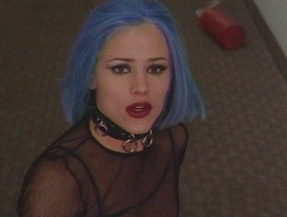Mythology: Alias
By Martin Felipe
June 9, 2010
BoxOfficeProphets.com

It seems that there have been some minor rumblings at ABC indicating that they might be interested in having JJ Abrams bring Alias back. I’m not sure if this would be a sixth season, or if it would be a remake/reboot (whatever the difference is), but the story goes on to say that, were it to happen, it would be a leaner version of the show, without the Rambaldi mythology.
Now, I have great doubt that this will happen. Despite enjoying the tiny-but-loyal fan base typical of mythology shows, Alias is notorious for exploding on the scene in 2001 with an acclaimed couple of seasons before losing its edge and fading off into obscurity. (While I won’t say that the quality of the show doesn’t dip after season two, much like Lost, I will maintain that the drop in quality is overstated and then move on.)
Like many a mythology show, Alias enjoyed a brief period of decent ratings before downgrading itself to struggling status for most of its run. This, I would argue, is due more to the complexity of the narrative than to any perceived drops in quality. There are few network shows that are as difficult to pick up midstream than Alias. With characters leading double and triple lives, murky, shifting motivations, criss-crossing subplots, evolving back-stories, and, of course, a dense mythology involving a Da Vinci-meets-Nostradamus prophet named Rambaldi, Alias makes Lost as easy to follow as See Spot Run.
It’s this very complexity that made it such a critical success and cult hit in the show’s first couple of years. Well, that’s not quite true. Akin to Lost, Alias is about the characters first and the mythology second. We see the events of the show through the eyes of our heroine Sydney Bristow, and it is through these eyes that we meet her group of pals, most notably her father Jack and her employer/nemesis Arvin Sloan. She’s our emotional lightning rod, grounding us and leading our feelings about the characters, even as the events they experience grow ever more outlandish and fantastic.
Thing is, the characters, with the exception of perhaps Marshall, also grow more outlandish as we learn more about them. Layer after layer unpeels over the course of the show’s five seasons, and we form a more and more complex relationship with them all.
The complexity of the characters is indicative, however, of the overall narrative and mythology. I’m not kidding when I say that you need a flow chart to figure out exactly what happens in the show’s 100 plus episodes. I don’t mean this as a criticism. More than even Lost, Alias trusts its audience to connect the dots and piece it all together. The ambition and scope of the show is light years beyond what one has come to expect from network programming.
And this is where my issue comes in with the unlikely prospect of an Alias return to the small screen. Several times in its run, Abrams and his team reset the show in either a self or network mandated effort to simplify things. They give an admirable effort of tying the many iterations of the story together to form one cohesive whole, but it’s this constant reinvention that so disillusioned fans and critics, leading to its unfair-in my opinion-reputation as a show that ultimately fails to deliver upon its promise.
We are in the midst of a revolution in our national relationship with television. Whether it’s because of the rise of the cable networks as sources of quality, the advent of TV on DVD, or the increasing use of sites like hulu.com, television is growing more splintered and fractured than ever before. With Lost’s heralded finale scoring only 13 million viewers, the idea of the big television event, or the huge hit show is becoming a thing of the past. Specialized programming is the future of the industry. A great example of this is Chuck, a lighter entry in the spy genre. Though, by no means a solid success, positive reviews and a loyal fan following have allowed Chuck to survive, if not thrive, for the past three years. In the past, with the numbers it has, Chuck would have been on the chopping block after its initial 13-episode order.
The benefit of this new direction is that networks don’t really need to dumb their programming down. That doesn’t mean that there isn’t a place on the tube for simpler fare, but it also doesn’t mean that shows like Alias need to lighten their load. It was apparent early on that the masses were never going to embrace Alias. There were fans and critics, however, who would follow every turn, analyze every twist, and join Sydney on every adventure. These are the viewers who ABC should target and market to.
So why, in this brave new televised world, is the network even considering bringing back a tainted product in an even more tainted way? If the cult of Alias even still exists four years after the last episode aired, then aren’t they the ones ABC should be catering to? Dropping Rambaldi or the twisting narrative isn’t going to bring new viewers into the fold, not for a show that has the reputation for having dropped in quality. For that matter, fans don’t want to see a shell of the show’s former glory.
The bread and butter of the Alias franchise is its fans. If that audience is too small, then ABC should just quit while it’s ahead. If that audience isn’t too small, then don’t chip away at it by delivering a watered down product, further damaging the reputation of a once heralded program. If Alias is to make a triumphant return, then it should do so, Rambaldi and all.